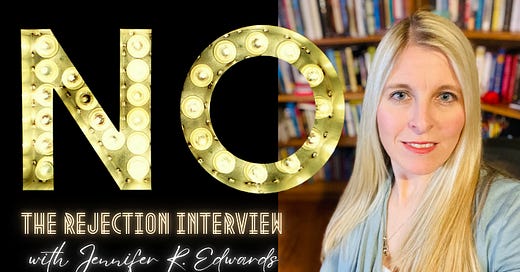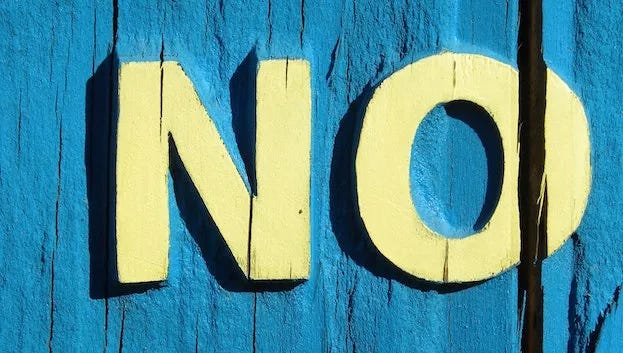Submission Sunday 8.25.24: The Rejection Interview with Jennifer R. Edwards
Our latest rejection interview: "Sometimes you really just need to gamble on yourself."
Happy Sunday, writers! Thank you for subscribing.
Herein I continue my quest to interview successful people about their experiences with rejection. I’m grateful to writers Cecil Castellucci, Kate Maruyama, Camden Noir, and Tamara MC for agreeing to participate in The Rejection Interview series, and next up we have our first poet, Jennifer R. Edwards. I was delighted when she answered a call I posted here for willing writers awhile back, and I’m even more delighted that we finally pulled it together.
Jennifer R. Edwards’ debut collection, Unsymmetrical Body, was a 2023 Eric Hoffer Honorable Mention, First Horizon Finalist and Boston Authors Club Julia Ward Howe Award Finalist. Her poems have received Pushcart and Best of the Net nominations, New England Poetry Club Amy Lowell Prize, and support from conferences. Her poems appear in anthologies and journals including RHINO, Mom Egg Review, One Art, Emerge Literary Journal, Gyroscope Review, Passengers Journal, Terrain, Literary Mama, and Snapdragon. She’s a preschool speech-language pathologist and MFA Candidate at Bennington Writing Seminars. She resides in Concord, NH.
You can follow Jennifer on Instagram or Twitter after you’ve read her rejection interview and need to know more! Let’s get this interview started…
SS: Thanks so much for agreeing to this interview, Jennifer! Would you say that you fear rejection? Why or why not?
JRE: Yes and No!
Yes, because I’m a realist and know much of the work I send out will be rejected, and I have limited financial resources, so I don’t submit to many places or expensive contests or sometimes book awards because I understand that often that work will get rejected. I suppose for me, I expect rather than fear rejection. I’m always thinking, what’s the worst that could happen, and that is the rejection, but it’s not really a big deal to get rejected. Move on.
No, because I too have been a reader for lit mags, and I have been writing, reading, attending writing conferences, and in a MFA program currently talking about rejections and publications. It is all subjective! The process of rejection and doing your best to go after what you want is all a necessary part of the writing life and life in general. For me, part of living is constantly reevaluating what “failure” is and how that can be framed. Rejections result in a weird sort of growth or toughening but I’m not trying to say it isn’t difficult. I’d take the lows of rejection anyway, knowing that once in awhile I’ll have the highs of publication and having someone come across your work and say it resonated with them, or having an editor feel excited to welcome you into their pages.
SS: What does literary rejection mean to you?
JRE: Well, I try to listen to what the rejection letter is telling me and I think people really need to be able to hear constructive criticism and specific encouragement if it is provided. I generally don’t post rejection letters or even acceptance letters (besides the erasure trend which I enjoyed with blacked out info) because I somehow feel that’s private correspondence and I try to be careful what sort of info I provide because the variability of reactions can be troubling. Sometimes I’ll feel a rejection confirms feelings I have: maybe the work needs to be revised, or “isn’t ready yet,” or what felt current at the time I wrote it was too long ago.
I used to kind of roll my eyes at these writers bragging online about “positive rejections” and felt rejection is rejection. But now I really notice and appreciate more personalized rejections and I’ve had some very positive ones (from Room, Rust and Moth, etc.) where it’s clear my poems have gone to the series editor or were discussed at length. Those letters sometimes come at the exact moment you need them. I use those letters to let me know which poems are stronger. I do feel I can tell when an editor truly means it when they encourage resubmission. I don’t take rejection as a personal failure of myself or the work.
But I do feel like rejection can have many causes: high numbers of submissions for very limited spaces, limited readers, production time constraints, many different financial limitations. The July 2024 Rattle Ekphrastic Response had 460 submissions with only two poems picked. The “skulls for the skull-les” HAD call in Feb 2024 had over 900+ submissions and the rejection letter said “taste is subjective...this is an incredibly subjective…knee jerk response.”
SS: What’s a rejection that you mourned at the time but now are grateful for?
JRE: I suppose I’m not exactly grateful for any rejections ever! I will say I’ve had many poems rejected that I revised, and then the poems went on to be published elsewhere. When that happens, I’ve often felt like the poem somehow found its true home. For me, its not necessarily prestige or selectiveness that I hold out for. It is sometimes the less well-known literary magazines where I have felt the most appreciated, respected, and supported or built the most long-term relationships. These are the journals that have nominated my work for the Pushcart Prize (New Hampshire Poetry Society) or Best of the Net (Emerge Literary Journal). My poem “Learning Taekwondo with My Tween Son” that was recently published in RHINO 2024 was also accepted at a different journal early the next AM (I was literally logging on to withdraw it!) and though the second journal was offering hundreds of dollars for it, my poem had already found its home at RHINO.
SS: What’s a literary rejection that still bothers you?
Keep reading with a 7-day free trial
Subscribe to Submission Sunday to keep reading this post and get 7 days of free access to the full post archives.





